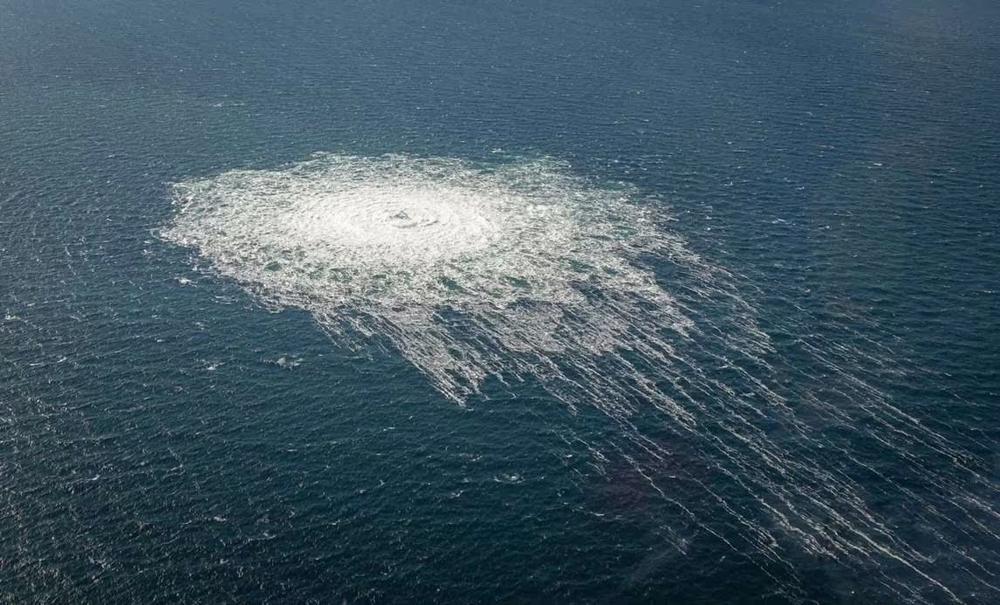Key developments on Oct. 8:
- Kyiv says it is not interfering in case of Ukrainian detained in Poland over Nord Stream sabotage
- Russia says Trump-Putin 'strong' Ukraine peace momentum 'exhausted' as talks stall
- Ukraine, EBRD discuss funding additional gas imports amid rising Russian strikes on energy sector
- Belgium-based arms maker reports mounting cases of suspicious drone sightings
Kyiv is not interfering in the case of a Ukrainian citizen detained by Warsaw at Germany's request in connection with the Nord Stream pipeline sabotage, Ukraine's Ambassador to Poland Vasyl Bodnar said on Oct. 7.
The comments come amid renewed debate over the Nord Stream 2 pipeline and Poland's handling of a German extradition request for a Ukrainian national accused of involvement in the 2022 explosion.
The suspect, identified as Volodymyr Z., was detained in September in east-central Poland.
Bodnar emphasized that the case is a judicial matter under Polish jurisdiction.
"We are not interfering because this is simply a court case. Everything depends on justice," he told Polish outlet RMF FM. "Of course, the court is the court, and it must make the appropriate decision. The Ukrainian side is acting in accordance with Polish law."
"It is in our interest to protect the interests of our citizens, and we, for our part, as the embassy and consulate, are providing him with all the necessary support."
The Nord Stream 2 pipeline, which never became operational, had long been a flashpoint in European energy politics. Even before Russia's full-scale invasion of Ukraine in 2022, critics warned that it deepened Germany's dependence on Russian gas and undermined European energy security.
Polish Prime Minister Donald Tusk also commented on the case, saying that those who built the Nord Stream 2 pipeline "should be ashamed and remain silent," not those accused of sabotaging it.
Russia says Trump-Putin 'strong' Ukraine peace momentum 'exhausted' as talks stall
The "strong momentum" for ending the Russia-Ukraine war, built upon the August meeting between U.S. President Donald Trump and Russian President Vladimir Putin in Alaska, has faded, Russian Deputy Foreign Minister Sergei Ryabkov said on Oct. 8.
Ryabkov's remarks indicate an increasing pessimism about peace talks following Putin's effective dismissal of direct negotiations with President Volodymyr Zelensky — an initiative that Trump personally backed.
"We have to acknowledge that the strong momentum created in Anchorage toward reaching agreements has been largely exhausted due to the efforts of opponents... primarily Europeans," the Russian deputy minister said.
Ryabkov added that Washington has yet to respond to Putin's proposal to extend the Strategic Arms Reduction Treaty (START) limitations for another year after its scheduled expiration in 2026.
"It's an outstretched hand. If they're not interested, we'll manage without it," he added.
Putin proposed last month that Moscow and Washington maintain current nuclear arms limits under the 2010 treaty, which remains the last bilateral arms control agreement between the two powers.
Trump and Putin met in Alaska on Aug. 15 to discuss peace settlement in Russia's war against Ukraine and broader cooperation, marking their first meeting since the U.S. president returned to office.
While Trump pledged to arrange direct talks between Zelensky and Putin, no agreement was reached.
Zelensky rejected Putin's invitation to meet in Moscow, calling it impossible while Russia bombs Ukraine, but repeatedly said he is ready to meet the Russian leader on neutral ground.
Ukraine, EBRD discuss funding additional gas imports amid rising Russian strikes on energy sector
Ukraine's finance minister met with Matteo Patrone, vice president of the European Bank for Reconstruction and Development, on Oct. 8 to discuss financial support for Ukraine's energy system, as Russian attacks on its energy infrastructure surge ahead of winter.
Last week, on Oct. 3, Russia launched mass missile and drone strikes at gas production facilities in Ukraine's Kharkiv and Poltava oblasts.
State-owned oil and gas giant Naftogaz called the attack the "most massive" to date against its gas production since the start of the full-scale war, saying Russia had launched 35 missiles and 60 drones at its facilities. Ukraine's largest private energy company, DTEK, said it was forced to halt production at its Poltava Oblast gas facilities following the attack.
Just two days later, Russia carried out another large-scale attack on gas infrastructure critical to residential heating, causing significant damage and destruction, according to Naftogaz.
As a result of the strikes, Energy Minister Svitlana Hrynchuk announced on Oct. 7 that Ukraine plans to increase natural gas imports by 30%.
Representatives of the Ukrainian government and the EBRD discussed ongoing and future projects in both the public and private sectors, Ukraine’s 2026 budgetary needs, and funding priorities, including support for the country’s energy system.
"We discussed with the EBRD the possibility of securing additional financing for gas purchases to ensure the stable passage of the 2025–2026 heating season," Ukraine's Finance Minister Serhii Marchenko said.
"This is an urgent priority in light of Russia's intensified attacks on Naftogaz facilities and Ukraine's energy infrastructure as a whole," the minister added.
The parties also explored options for covering gas procurement needs with the involvement of other donors, as well as the potential to attract funding backed by EU guarantees.
Belgium-based arms maker reports mounting cases of suspicious drone sightings
European arms company Thales has raised concerns over the number of unidentified drones spotted recently over its Belgian facility that produces 70 mm rockets, Politico reported on Oct. 8.
The news comes as suspicious drone activity has caused alarm across Europe, with some cases having been linked to Russia.
Alain Quevrin, country director for Thales Belgium, told Politico that the company is "seeing more drones than what was the case a few months ago" and highlighted sightings at the Evegnee Fort site in the eastern part of the country.
The company's Belgium-based facilities have been ramping up the production of 70 mm rockets that can be used against drones, supplying both European countries and Ukraine.
Thales' facilities could use its jamming equipment to bring down the drones, but the Belgian government must first set the legal procedures for such cases, Quevrin said.
Arms demand is growing in the European market amid Russia's full-scale invasion of Ukraine and fears of a potential clash between NATO and Moscow, exacerbated by recent drone incursions.

 Logitech’s MX Master 3S is one of the best wireless mice around, and it’s 25 percent off
Logitech’s MX Master 3S is one of the best wireless mice around, and it’s 25 percent off